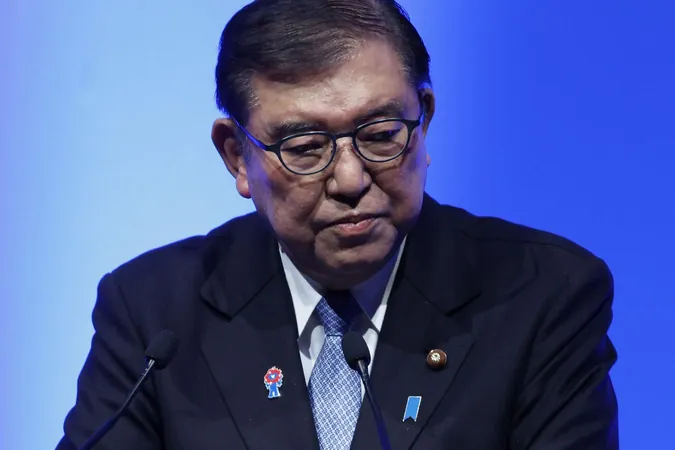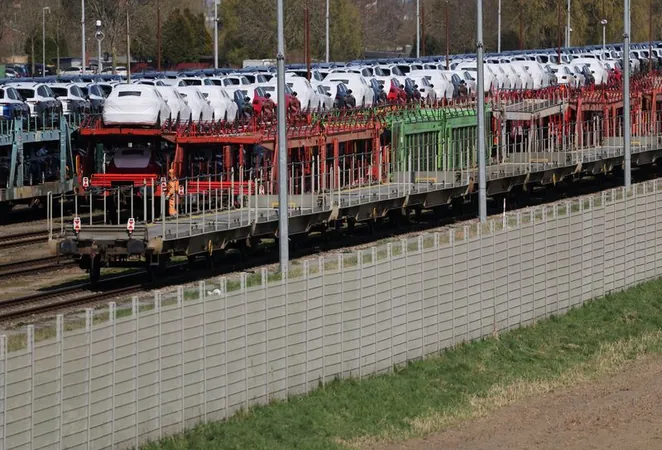
Trump’s 25% Tariff on Japan: A Trade War Japan Could Have Predicted
2025-03-29
Author: Ming
Introduction
In a troubling turn of events for Japanese Prime Minister Shigeru Ishiba, his approval rating has plummeted below 28%, leaving many to question how it wasn't lower. To make matters worse, Ishiba is currently embroiled in a scandal involving gift vouchers distributed among his fellow Liberal Democratic Party (LDP) members, which is amplifying dissatisfaction among citizens. However, the larger crisis stems from an economy that has seen minimal attention since Ishiba assumed office on October 1, a situation now exacerbated by U.S. President Donald Trump’s impending trade actions.
The Tariff Announcement
Recent announcements reveal that Trump will impose a staggering 25% tariff on imports of foreign automobiles and their parts, a move that signals an escalation in the trade war Japan had hoped to avert. The LDP should have anticipated this outcome; a clearer understanding of Trump's negotiation style might have prepared them better for the challenges ahead.
Misguided Optimism in Diplomacy
During a significant meeting back in February, Ishiba met with Trump and declared that he had established a solid relationship with the U.S. President. The tacit expectation was that he would be able to shield Japan from Trump’s tariff threats, especially concerning the lucrative auto industry. Unfortunately for Ishiba and his cabinet, those hopes have proven to be unfounded as Japanese markets brace for the fallout of this new wave of tariffs.
Lessons from the Past
What Ishiba’s administration appears to overlook is the hard lesson learned during the Trump 1.0 era (2017-2021) when former Prime Minister Shinzo Abe struggled to navigate Trump's unpredictable approach. Although Abe was praised for his diplomatic engagement with Trump, the reality is that Japan failed to secure any exemptions from tariffs on key imports like steel and aluminum and lost out when Trump withdrew the U.S. from the Trans-Pacific Partnership, a cornerstone of Japan's strategy to counter China’s influence.
Underestimating Trump's Policies
The myth that Abe had mastered the art of dealing with Trump has clouded Ishiba’s approach, leading him to uniquely underestimate Trump's renewed aggressive policies. As of now, Trump has categorized Japan alongside China as a nation engaged in currency manipulation, ruining any chance Ishiba had at presenting a strong front on trade.
The Business Community's Realization
The business community in Tokyo now realizes the complexity of negotiating with Trump's approach, which does not conform to traditional diplomatic engagements but rather leans towards extortion-type maneuvers—offering fleeting advances, only to return with heightened demands shortly after.
Ishiba's Political Future
This precarious position puts Ishiba at risk of falling into the “12-month club,” a colloquial term referring to Japanese leaders who fail to last beyond a year in office. Historically, while leaders like Abe maintained prolonged tenures, most are not so fortunate, and Ishiba's path appears to be particularly precarious.
Approval Rating Decline
With an approval rating now recorded at just 27.6%, a significant drop of 12 percentage points since the beginning of the year, even Ishiba's previous image as a politician free from scandal is now in jeopardy. This decline, coupled with the realization that he has not been able to shelter the economy from the repercussions of Trump's trade war, poses dire expectations for the upcoming national elections in July.
Economic Implications and Future Risks
Further complicating matters is the Bank of Japan, which has been working to normalize interest rates under Governor Kazuo Ueda. Recent efforts suggest we could soon see short-term rates above 0.5% for the first time since 2007. However, Trump’s trade strategies may force a pause in these moves. The risk is palpable: should Trump push to weaken the dollar, and simultaneously, Japan raises interest rates, the yen could soar unpredictably, potentially driving Japan deeper into recession.
Global Economic Ramifications
As China continues to export deflationary pressures and Trump’s taxes threaten Japanese automakers, the ramifications of these economic policies extend beyond Japan to the global market, raising alarms about economic stability.
Conclusion
With precarious winds blowing through his administration, Ishiba faces not only the likelihood of political turmoil but also existential threats to Japan's economic prosperity. The future of the LDP, and perhaps Ishiba’s own legacy, hangs in the balance as the nation faces these turbulent times head-on.




 Brasil (PT)
Brasil (PT)
 Canada (EN)
Canada (EN)
 Chile (ES)
Chile (ES)
 Česko (CS)
Česko (CS)
 대한민국 (KO)
대한민국 (KO)
 España (ES)
España (ES)
 France (FR)
France (FR)
 Hong Kong (EN)
Hong Kong (EN)
 Italia (IT)
Italia (IT)
 日本 (JA)
日本 (JA)
 Magyarország (HU)
Magyarország (HU)
 Norge (NO)
Norge (NO)
 Polska (PL)
Polska (PL)
 Schweiz (DE)
Schweiz (DE)
 Singapore (EN)
Singapore (EN)
 Sverige (SV)
Sverige (SV)
 Suomi (FI)
Suomi (FI)
 Türkiye (TR)
Türkiye (TR)
 الإمارات العربية المتحدة (AR)
الإمارات العربية المتحدة (AR)